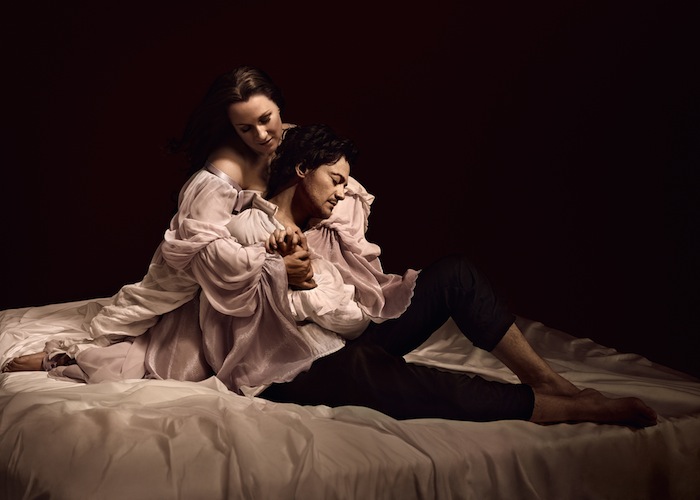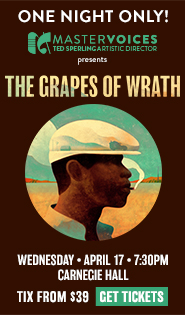Met’s “Roméo et Juliette” closes 2016 with dramatic fireworks

Diana Damrau and Vittorio Grigolo in Gounod’s “Roméo et Juliette” at the Metropolitan Opera. Photo: Kristian Schuller
Not every opera in the standard repertoire is a Tosca, a Nozze di Figaro, or a Parsifal.
The Metropolitan Opera rang in the new year on Saturday with a new-to-New York production of Roméo et Juliette, Charles Gounod’s take on Shakespeare’s classic tragic romance. The piece itself is not especially brilliant–relying on sheer aural attractiveness, Gounod’s music largely falls short of the depths of feeling found in Shakespeare’s text, entertaining with its frills but rarely finding much in the way of emotional weight. Even so, with a cast as superb as the one the Met fields for the current run, it can be as heartrending as anything in the major rep.
The combination of Vittorio Grigolo and Diana Damrau is becoming as sure a bet as any for pure emotional firepower onstage. Grigolo, the passionate Italian tenor, was everything one expects him to be as Roméo–forceful, intense, over-the-top, and, in the end, irresistible. There is little nicety in the Grigolo style–he pushes the pedal to the floor, and in material like this, demanding single-minded fervor from the actor, the effect is totally convincing. His glowing, passionate account of the aria in the timeless balcony scene, “Ah! lève-toi soleil,” was the first of several highlights to earn show-stopping cheers at Saturday’s premiere.
Grigolo’s manic energy, leading him to climb on the scenery when he’s not chewing it, elicits a laugh or two, yet he throws such fire into his performance that it becomes impossible not to take him seriously. His voice itself is a captivating force, an instrument of enormous power. Though there is an unmistakable brightness in his tone, top notes are so full-bodied that they become more of a boom than a ring. And for someone with as aggressive a style and searing a voice as he has, Grigolo can show remarkable vocal control when he puts his mind to it–the aching whispers that he showed off in the balcony duet were stunning.
Though Grigolo’s stylistic opposite in many ways, Damrau was a perfect match as Juliette. There isn’t a great deal of meat on her voice, and this role, asking for lush lyricism more than high-flying agility, doesn’t seem immediately flattering to her instrument. But where Grigolo overpowers with the force of his presence, Damrau is all subtlety, breathing life into her character with every delicate turn of a phrase. Act One’s “Je veux vivre” was simply enchanting, a buoyant, feather-light waltz, sparkling with girlish innocence. The youthful brightness of the first act contrasted starkly with her later “Amour ranime mon courage,” which took on the feel of a rousing battle-cry as she steeled herself to drink Friar Laurence’s potion.
For all the power of their individual arias, it was the leading couple’s slew of duets that made the evening truly memorable. The sincerity of their relationship, a sudden but joyous romance, was bewitching, and they channeled that charm into all of their scenes together, playing off one another vocally as well as dramatically. The rapturous duet “Nuit d’hyménée” was sung with intense passion, made all the more poignant by Roméo’s impending exile.
The production by company stalwart Bartlett Sher is consistently effective, if somewhat undemanding. Placing all of the action on a handsome Veronese streetscape designed by Michael Yeargan, the staging provides small alterations, such as heavy bronze door and sarcophagi flown in from above, to hint at interior scenes. Rather than trying to push any peculiar vision of the piece, Sher tries to make it communicate the essentials and appeal visually, enlisting Catherine Zuber to push the setting forward to the eighteenth century with sumptuous costumes. In a welcome change from many of the company’s stand-by stagings, B. H. Barry’s fight choreography is actually convincing, making the crucial fight in the marketplace a swashbuckling treat to watch.
The supporting cast benefited greatly from the liveliness of the opera’s larger scenes. Diego Silva made an exceptional debut as Tybalt, flashing a consistent, buttery tenor and working himself up to burning insistence as he made his fateful challenge to Romeo. Elliot Madore impressed as a swaggering Mercutio with a rich, burgundy voice. Virginie Verrez showed an airy, bright mezzo in the trouser role of Stephano, while David Crawford preened about as a dandyish Paris.
Mikhail Petrenko was a sincere, sympathetic Frère Laurent, giving the vocal part a whiff of smoke, and Oren Gradus brought a firm, thick sound to the Duke’s role. The fortuitously named Diana Montague was instantly winning as Juliet’s nurse, Gertrude, a feisty, hard-nosed presence among the frivolity of Veronese society. The real standout of the supporting cast was Laurent Naouri, irrepressibly affable as Capulet until brought to grief by the death of his nephew.
Presiding in the pit, Gianandrea Noseda was as brilliant as ever, leading a tight performance and drawing rich tones out of the orchestra. The dependable Met chorus, offered several turns in the limelight in Gounod’s opera, were at their radiant best, both in their tender hushes and their vaulting heights.
Roméo et Juliette runs through March 18 at the Metropolitan Opera. Amanda Woodbury sings the role of Juliette on January 25. A second cast, starring Stephen Costello and Pretty Yende in the title roles, opens on March 3, with Emmanuel Villaume conducting. metopera.org.



